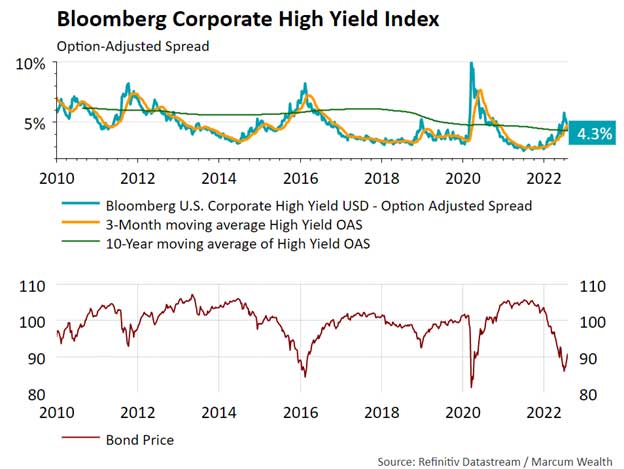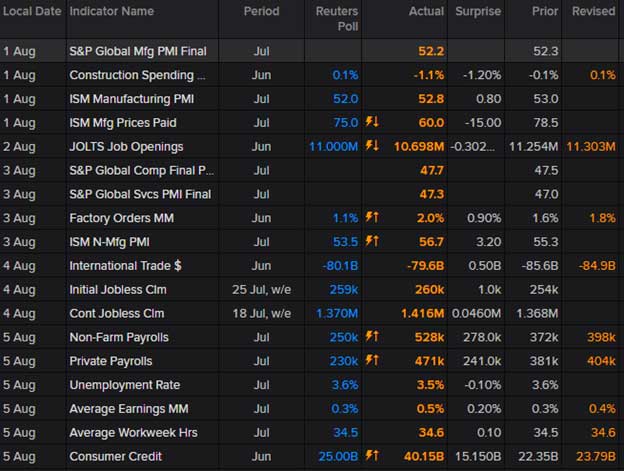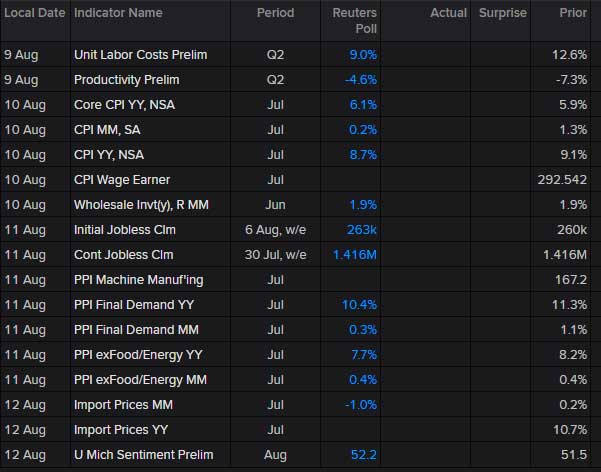
Chart of the Week
Corporations with debt rated below investment grade are in a category called “high yield.” Because the risk of default is higher, they have to pay a higher interest rate, or spread, over Treasuries. This spread reached 5.8% for the high yield index a month ago, but then rapidly declined to 4.3%. (The average bond price also increased during this time, rising from $86 to $91.) When the spread narrows this quickly, it is a positive sign for risk markets.

What We’re Reading
Breaking Points – Collaborative Fund
Why You Shouldn’t Abandon Bonds – Vanguard
Central Bank Digital Currencies, What’s the Deal? – Institutional Investor
How Much Do Supply and Demand Drive Inflation? – San Francisco Federal Reserve
‘Jobful Vibecession’ Will Keep Workers on the Payroll – Bloomberg
Podcast of the Week
Peak of Summer, US Interest Rates Outlook – Macro Horizons
The Past Week
The jobs report blew estimates out of the water with 528,000 jobs added in July, bringing the unemployment rate down to 3.5%. The S&P Purchasing Manufacturer Index reports showed a contraction, while the Institute for Supply Management Index beat forecasters on the upside. On Sunday, the tax and energy bill passed the Senate. The final version did not raise taxes on the wealthy but did target technology companies to pay a minimum 15% tax on financial statement profits.

The Week Ahead
Inflation data is the name of the game this week. We have reports on the Consumer Price Index on Wednesday and the Producers Price Index on Thursday. A lot of companies will report earnings this week including Coinbase, Brookfield Asset Management, and a number of hospitality companies.

We will be back next week.
Important Disclosure Information
Please remember that past performance may not be indicative of future results. Different types of investments involve varying degrees of risk, and there can be no assurance that the future performance of any specific investment, investment strategy, or product (including the investments and/or investment strategies recommended or undertaken by Marcum Wealth, or any non-investment related content, made reference to directly or indirectly in this commentary will be profitable, equal any corresponding indicated historical performance level(s), be suitable for your portfolio or individual situation, or prove successful. Due to various factors, including changing market conditions and/or applicable laws, the content may no longer be reflective of current opinions or positions. Moreover, you should not assume that any discussion or information contained in this commentary serves as the receipt of, or as a substitute for, personalized investment advice from Marcum Wealth. Please remember to contact Marcum Wealth, in writing, if there are any changes in your personal/financial situation or investment objectives for the purpose of reviewing/evaluating/revising our previous recommendations and/or services, or if you would like to impose, add, or to modify any reasonable restrictions to our investment advisory services. Unless, and until, you notify us, in writing, to the contrary, we shall continue to provide services as we do currently. Marcum Wealth is neither a law Firm, nor a certified public accounting Firm, and no portion of the commentary content should be construed as legal or accounting advice. A copy of the Marcum Wealth’s current written disclosure Brochure discussing our advisory services and fees continues to remain available upon request. Please advise us if you have not been receiving account statements (at least quarterly) from the account custodian.
Historical performance results for investment indices, benchmarks, and/or categories have been provided for general informational/comparison purposes only, and generally do not reflect the deduction of transaction and/or custodial charges, the deduction of an investment management fee, nor the impact of taxes, the incurrence of which would have the effect of decreasing historical performance results. It should not be assumed that your Marcum account holdings correspond directly to any comparative indices or categories. Please Also Note: (1) performance results do not reflect the impact of taxes; (2) comparative benchmarks/indices may be more or less volatile than your Marcum accounts; and, (3) a description of each comparative benchmark/index is available upon request.
